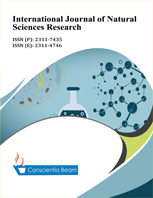Microbial Assessment of Fura-Nunu Sold in Eiyenkorin, Kwara State, Nigeria
DOI:
https://doi.org/10.18488/63.v10i1.3000Abstract
Food-borne diseases are the global public health problems encountered as a result of consumption of contaminated foods. To this end, this study was designed to evaluate the microbial quality of fura-nunu sold in Eiyenkorin, Kwara State, Nigeria. Samples of fura-nunu were collected at different locations within Eiyenkorin and were transported to laboratory for analyses. Microbiological analyses were performed using standard methods. Data obtained from microbial counts were subjected to analysis of variance (ANOVA). Results of total heterotrophic bacteria count (THBC), total coliform count (TCC) and total fungal count (TFC) of fura-nunu indicated that THBC ranged from 1.6 ± 0.03 × 107 - 2.3 ± 0.01 × 107cfu/ml, TCC ranged from 2.5 ± 0.71 - 15.0 ± 1.41 cfu/100ml while TFC was between 4.0 ± 0.41 × 106 and 5.0 ± 5.58 ×107 cfu/g. There were significant differences (P<0.05) in THBC, TCC and TFC of fura-nunu samples. pH values ranged from 4.25 ± 0.31 – 5.30 ± 0.21. The identified bacteria with percentage occurrence (%) include; Lactobacillus spp. (14.81%), Staphylococcus aureus (12.96%), Escherichia coli (17.59%), Bacillus subtilis (6.48%), Pseudomonas aeruginosa (3.70%), Enterococcus spp. (8.33%), Micrococcus spp. (6.48%), Salmonella spp. (13.88%), Klebsiella spp. (4.62%) and Lactobacillus plantarium (11.11%). Fungi species and prevalence (%) were Aspergillus flavus (21.21%), Aspergillus niger (30.30%), Saccharomyces cerevisiae (16.66%), Penicillium spp. (12.12%) and Mucor spp. (19.69%). Results of handling and hygienic practices showed poor handling, storage and hygienic practices by fura-nunu vendors. Hence, there is need for proper education of the vendors on general food safety practices.

